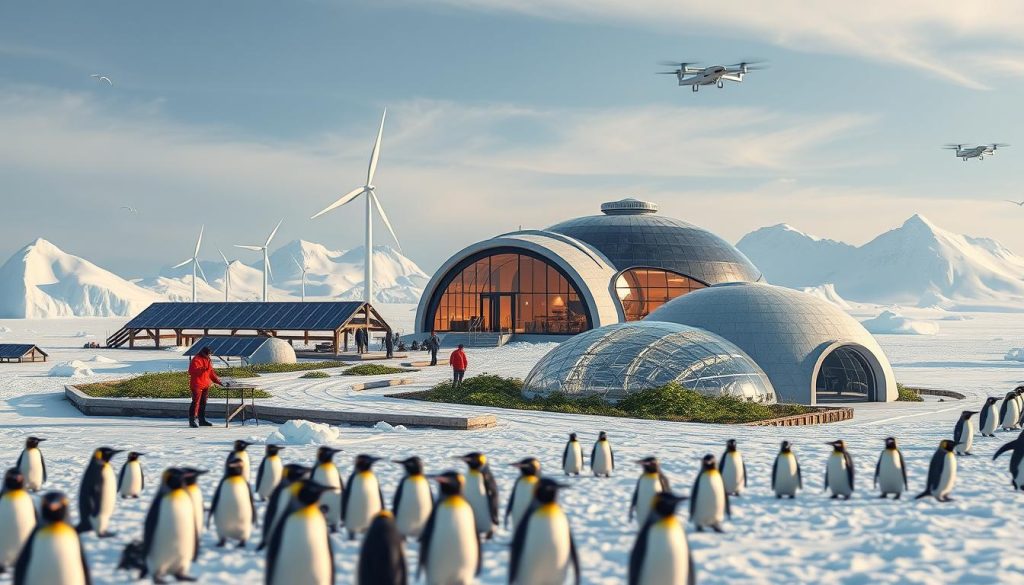Antarctica is gaining more interest, opening doors for new business ideas. Offerings like eco-tourism and scientific research present sustainable opportunities. These align with environmental goals globally. It’s important to understand the Antarctic Treaty System. This is key for entrepreneurs aiming to explore this resource-rich region. Technology plays a big role in unlocking potentials across various sectors. We will look into the vast opportunities for those ready to venture into this tough terrain.
Introduction to Antarctic Exploration Ventures
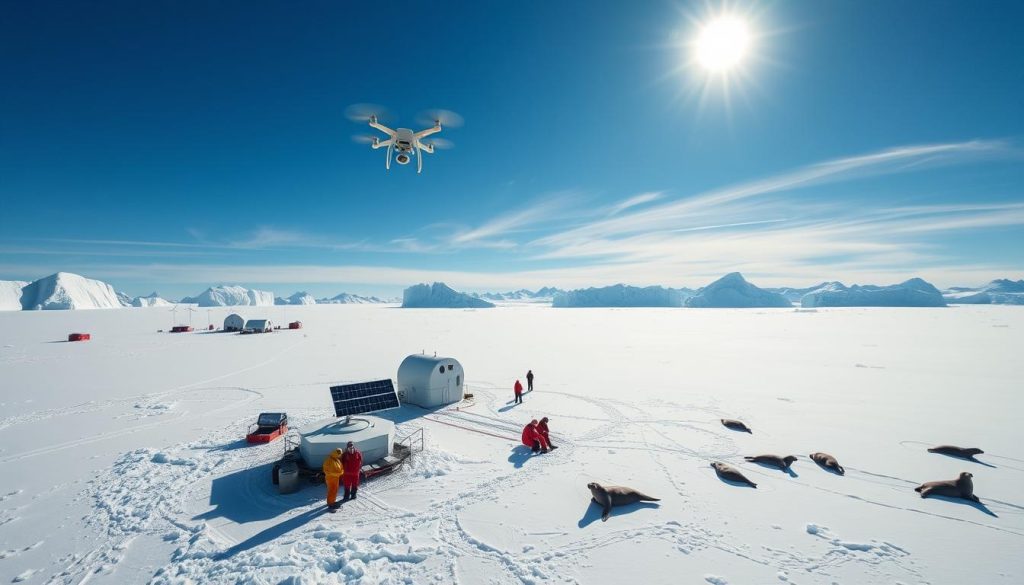
Antarctic exploration is becoming very popular for adventure and research. People have discovered its natural wonders over the years. This has made business-minded people interested in starting new ventures there. They see a chance to make money and help the environment.
Many different business paths have opened up. These paths let explorers find their own space in the Antarctic market. We have learned from past explorations. They showed us how to deal with harsh weather and hard-to-reach places. Now, to succeed, one must understand the rules and challenges of this remote area.
As more people want to start businesses there, understanding Antarctic expeditions is key. Entrepreneurs need to know how to make the most of these chances. They must follow strict environmental rules. There’s a big chance for new businesses in this untouched wilderness. But it’s important to think of new ways to explore without harming Antarctica’s unique nature.
Understanding the Unique Challenges of Antarctica
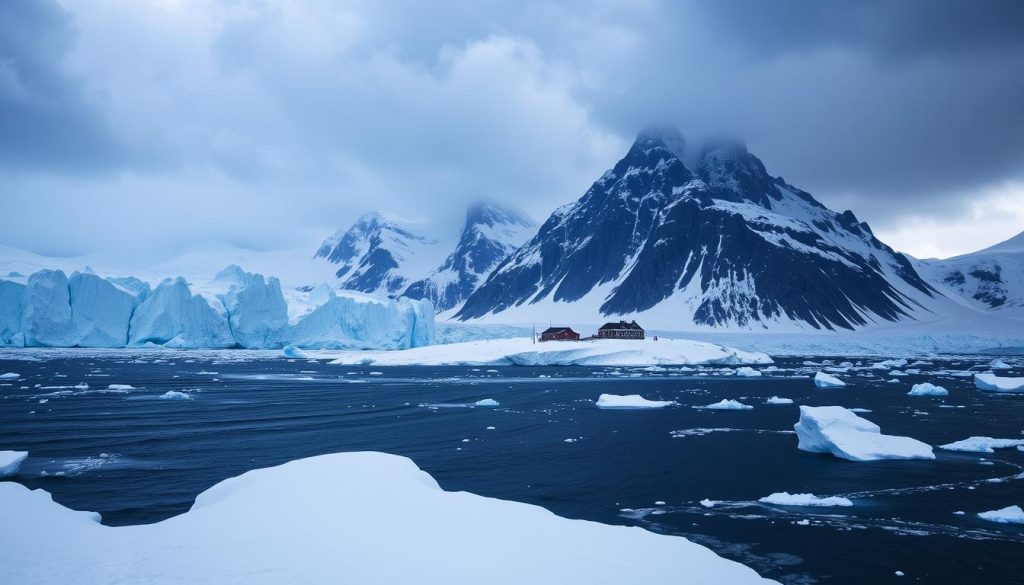
Antarctica offers unique obstacles that challenge explorers and businesses alike. The extreme cold and harsh weather require solid planning and robust infrastructure. These conditions affect everything from how well equipment works to the safety of the people involved.
Another big challenge is the area’s isolation. The limited roads and buildings make logistics tough. Companies need to plan carefully to make sure they can get what they need when they need it. They must manage resources and transport smartly.
Also, there are strict rules to protect the environment. Planning carefully and following these guidelines is a must. Companies in Antarctica must work to protect this unique place. They face many challenges in this amazing landscape.
What Are the Best Business Ideas for Antarctica?
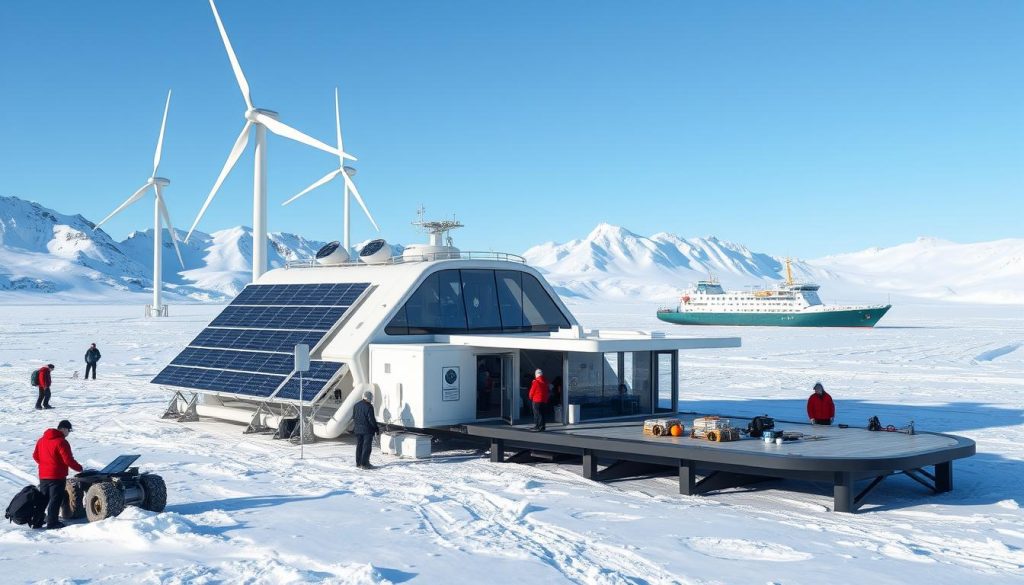
Antarctica is a unique place for starting new businesses. The most successful ideas work well in extreme conditions and are sustainable. Here are some top business opportunities:
- Eco-Tourism: This involves promoting tourism that helps protect the environment.
- Renewable Energy Solutions: Using solar and wind power meets energy needs in a green way.
- Scientific Research Initiatives: Starting research centres helps study climate change and preserves wildlife.
- Logistical Services: Transport and supply services make it easier to access remote locations.
These options show the range of businesses that can thrive in Antarctica. They focus on making a positive impact. By putting conservation first, these businesses aim to support the ecosystem and raise awareness.
Tourism Opportunities in Antarctica
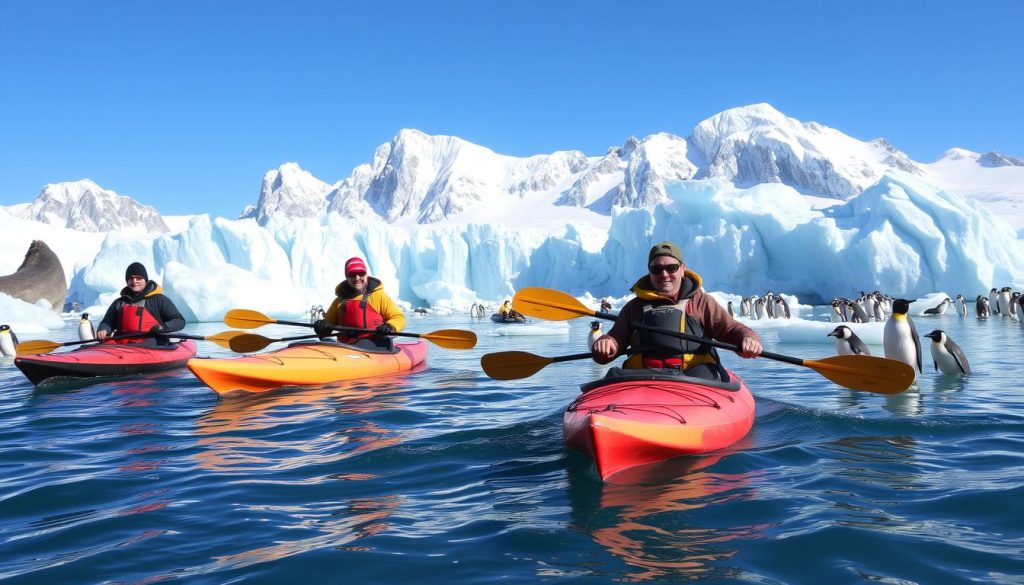
Antarctica’s tourism is growing fast, with a focus on eco-tourism and adventure tours. It’s a place where businesses can offer sustainable travel. They focus on protecting the environment while giving travellers great experiences. These operators attract those who care about the environment and help conserve it through learning.
Eco-Tourism and Sustainable Travel
Eco-tourism lets businesses encourage travel that protects nature. Operators focus on several key areas:
- Small group tours to keep the ecosystem safe.
- Working with conservation groups to teach tourists about wildlife.
- Promoting eco-friendly places to stay that help with sustainability.
These efforts make Antarctic tourism more attractive. They bring in visitors who want to see this untouched wilderness without harming it.
Adventure Tours and Guided Expeditions
Adventure tours give tourists a unique way to see Antarctica. They can hike, kayak, and watch wildlife, getting up close with nature. Here are some offerings:
- Guided walks through ice and incredible views.
- Kayaking to see marine animals up close.
- Trips to watch seals, penguins, and whales in the wild.
Operators can use these activities to make trips unforgettable. They show off Antarctica’s beauty and stress the importance of exploring responsibly.
Scientific Research and Innovation
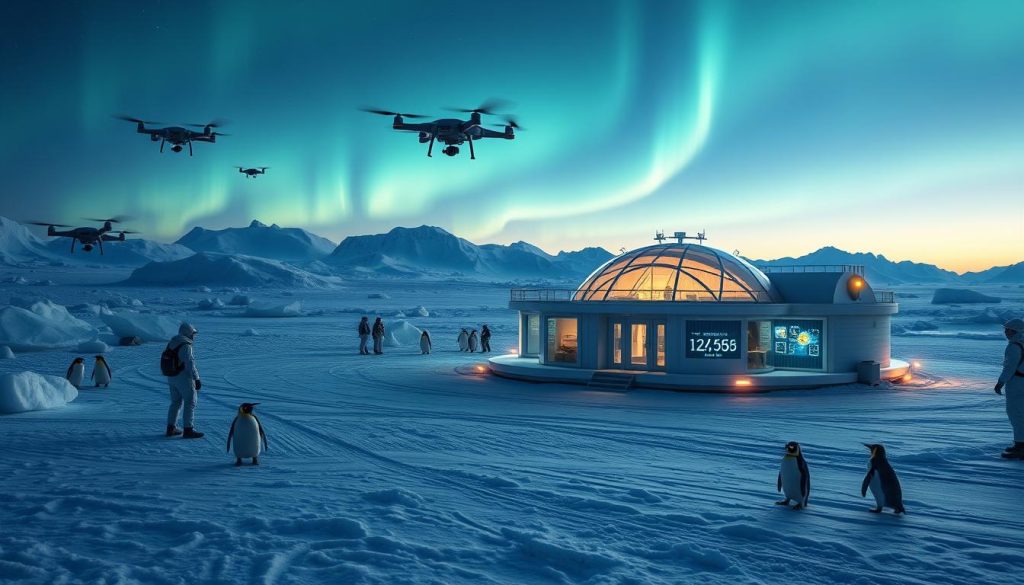
Research in Antarctica opens doors for business opportunities, particularly through setting up well-equipped research centres. Collaborations between universities and scientific groups focus on climate change and biodiversity. These partnerships are key in gathering important data to understand Antarctica’s unique ecosystem.
Research Facilities and Collaborative Initiatives
Building research facilities in Antarctica is crucial for scientific progress. These centres provide vital infrastructure and encourage partnerships across global academic circles. Such collaborations share knowledge and resources, enabling large projects to address environmental issues effectively.
Data Collection Services for Environmental Studies
Data collection businesses are increasingly essential for environmental studies. They use new tech to gather precise information on climate, marine life, and ice movements. These advancements improve Antarctic research and offer insights to protect its fragile environment.
Renewable Energy Solutions for Remote Operations
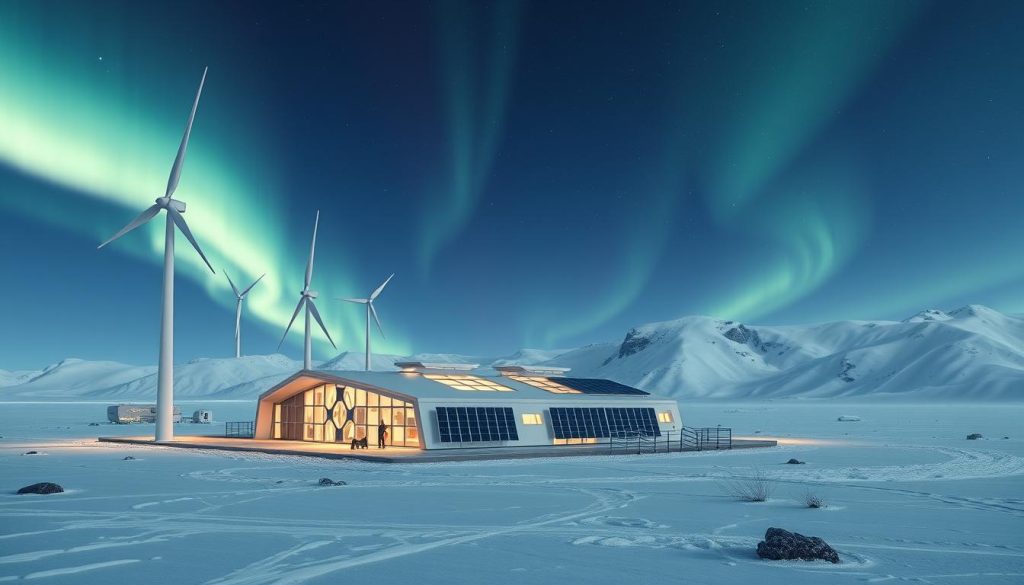
In Antarctica, the quest for energy requires new methods, especially renewable ones. As old energy types grow less viable, it’s crucial to adopt solar and wind energies. These energies not only perform well in unique conditions but also protect Antarctica’s delicate environment.
Solar Energy Implementation in Extreme Conditions
Solar energy is a great choice for remote areas in Antarctica, even in deep winter. Solar panels today cope well with cold and capture sunlight efficiently. They are already powering research bases and equipment, cutting down the use of fossil fuels.
- Solar panels with built-in heating capabilities
- Battery storage systems for energy during polar nights
- Integration with other renewable energy sources to enhance reliability
Wind Energy Potential in Antarctica
Wind energy is another strong option for Antarctica. Studies show its high winds could produce lots of electricity. So, wind turbines are worth considering for local businesses. Making gear that can handle the cold and wind is key to using this energy well.
- Turbines designed for high-efficiency performance
- Advantages of combining wind and solar energy
- Importance of environmental assessments before implementation
Logistics and Transportation Services
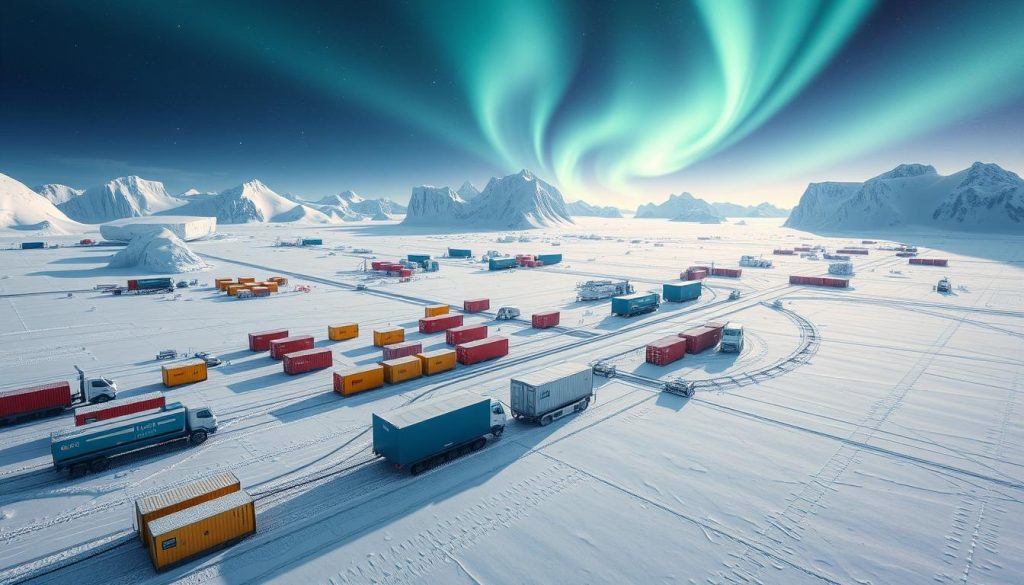
Logistics and transportation are key in keeping things moving in Antarctica’s tough conditions. They help get crucial supplies to where they’re needed, on time. Managing these supplies in such a remote place demands smart and creative logistic strategies. This makes careful planning vital for dealing with Antarctica’s extreme weather.
Supply Chain Management for Remote Locations
Managing supplies in Antarctica includes several steps:
- Assessment of local resources and limitations
- Coordination with international suppliers for specialised equipment
- Implementation of inventory management systems designed for extreme environments
- Utilisation of alternative transportation routes to navigate ice and storms
These steps help keep everything running smoothly, ensuring operations don’t stop.
Aviation Services: Aircraft for Remote Access
Aviation is crucial for transport in Antarctica. Using special planes helps researchers and supply missions reach their destinations. Aviation offers benefits like:
- Rapid transport of personnel and vital equipment
- Access to remote areas that are otherwise difficult to reach
- Flexibility in scheduling flights according to weather conditions
- Improved emergency response capabilities through aerial support
Adding aviation to logistics and transport makes operating in remote Antarctica more effective.
Wildlife Conservation and Monitoring
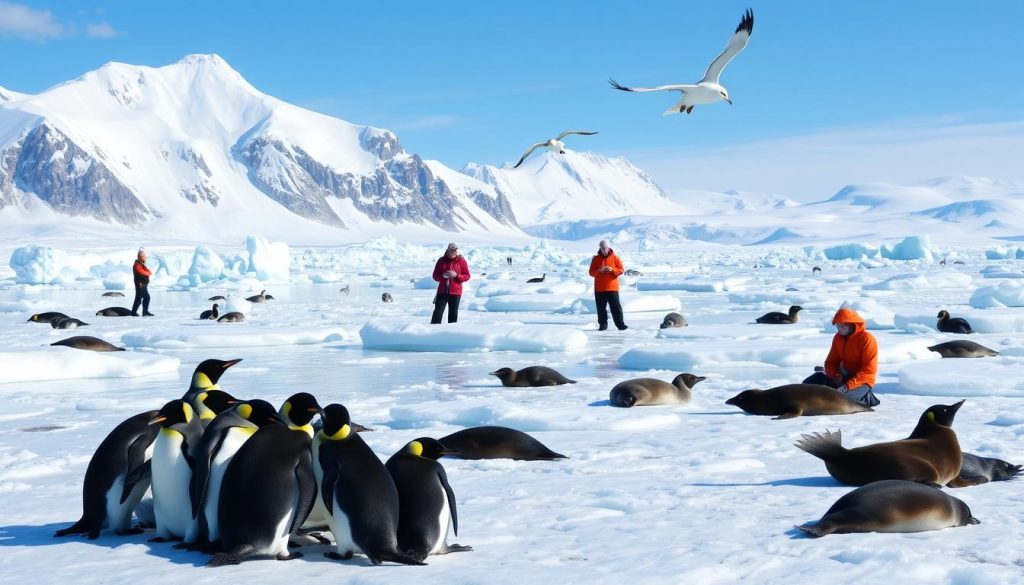
Wildlife conservation is crucial for keeping Antarctica’s unique ecosystems safe. Businesses and scientists work together here. They help by monitoring marine life and their homes.
This teamwork is key for finding the best ways to protect the area. They provide important information that helps everyone understand this delicate place better.
Researching Marine Life and Habitats
Studying marine life needs different methods. For this, businesses can:
- Conduct field studies to check on marine ecosystem health
- Use advanced tech to follow where species go
- Work with scientists to collect and study environmental data
This teamwork deepens our understanding of marine life changes and their homes. The information helps in making plans to keep Antarctica’s wildlife safe. It ensures its creatures and ecosystems last for many more years.
Eco-Friendly Conservation Initiatives
Research is important, but so are eco-friendly actions. Businesses can help by:
- Getting local people involved in saving the environment
- Spreading the word on why it’s vital to save marine life
- Choosing practices that don’t harm the planet
These steps do more than save wildlife; they unite everyone to care for Antarctica. Getting the community involved means more people helping to keep the sea’s life diverse. It helps everyone realise their role in protecting this special place.
Unique Merchandise and Local Crafts
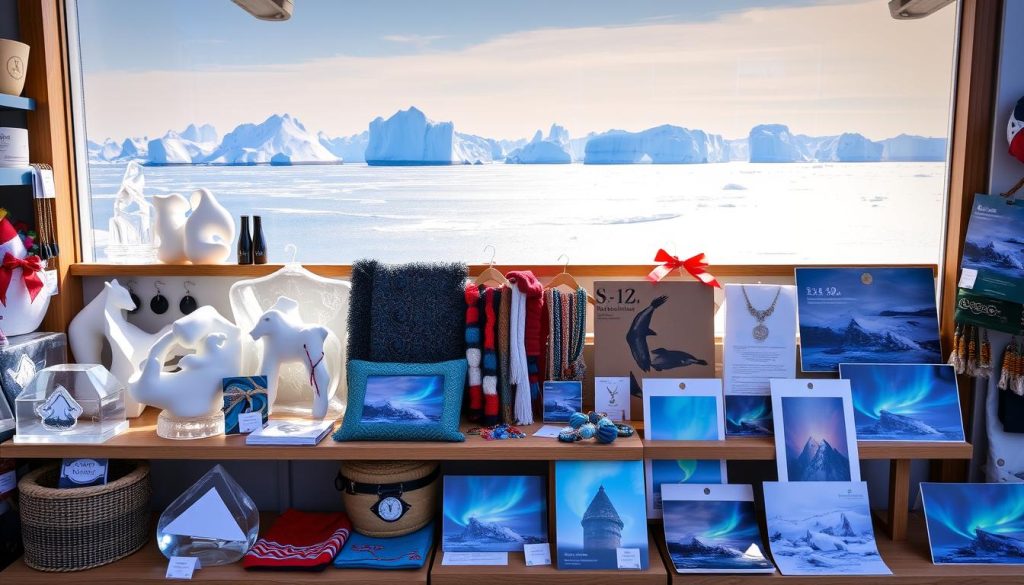
The Antarctic market offers a special chance for business minds. They can create products that mirror the untouched beauty and traditions of the area. This opens up ways to make unique items that capture Antarctica’s heart, all while backing ethical and green approaches.
Promoting Antarctic-Inspired Products
Products themed around the Antarctic have much to offer. They range from fashion and add-ons to items for the home. These remind us of the stunning landscapes there. By choosing eco-friendly materials, companies can draw in buyers who care about their environmental footprint.
Collaborative Projects with Local Artisans
Working together with local crafters is key to making one-of-a-kind goods. Joint efforts ensure trades are fair and support local communities. This leads to genuine local crafts that show off the creativity and heritage of the area. By backing these artisans, firms do more than just expand their product line; they also help the local economy and safeguard cultural heritage.
Environmental Technology and Services
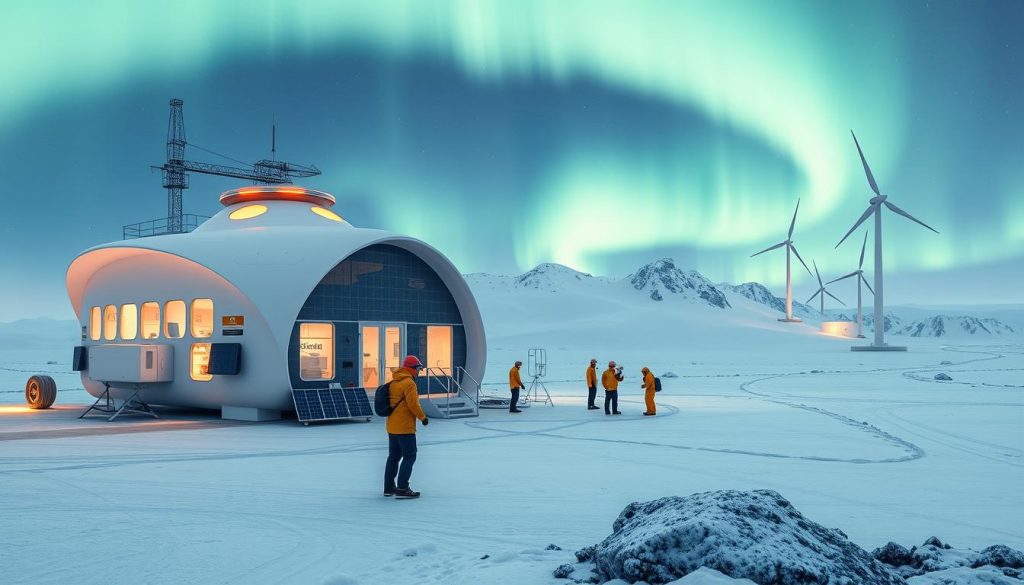
Antarctica is focusing more on environmental technology. This is crucial for its unique ecosystem. Innovations are targeting sustainable practices like waste management and water purification. These efforts aim to have a small impact on the environment while meeting operational needs.
Waste Management Innovations
Innovative ways to manage waste are key to keeping Antarctica’s ecosystem balanced. Companies are working on:
- Lowering environmental footprints by reducing waste.
- Turning waste into reusable resources through recycling.
- Using biodegradable options to cut down on pollution and increase sustainability.
Working together with environmental groups makes these approaches more effective. It ensures they meet the unique challenges of this remote area.
Water Purification Systems for Remote Areas
Clean water is hard to come by in Antarctica. High-tech water purification is vital for research and tourism. Important aspects include:
- Systems that turn natural water sources into drinking water.
- Portable units for teams on the move.
- Working with environmental groups to meet ecological guidelines.
Investing in these systems helps with sustainable practices. It meets essential needs in isolated spots. Good water and waste management support both research and tourism. This helps keep Antarctica an important place for ecology.
Health and Well-Being Services
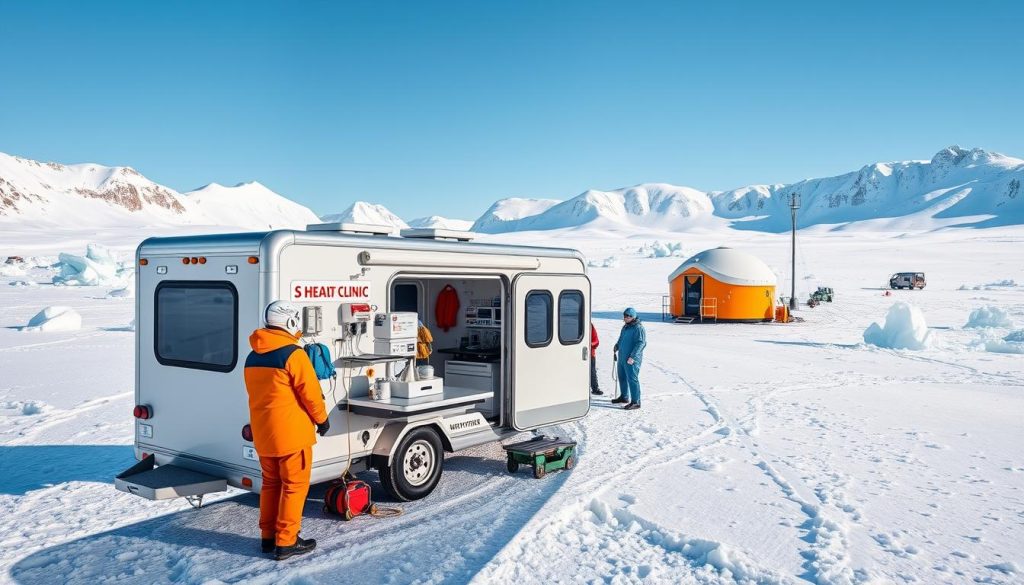
In Antarctica, offering strong health and well-being support is crucial for both researchers and tourists. Medical facilities there must handle the tough conditions, providing timely and effective help. Planning and setting up these services well can lower the risks from the harsh environment greatly.
Medical Facilities Tailored for Harsh Environments
Medical facilities in Antarctica need special features to work well in such tough conditions. They must have:
- Advanced telemedicine technologies for remote consults
- Emergency care units ready for extreme weather
- Cold storage for keeping medical supplies safe
Setting up these medical facilities means health services can stay up and running, no matter the weather outside.
Wellness Programmes for Researchers and Tourists
Wellness programmes added to the Antarctic experience help improve everyone’s health. These programmes include:
- Mental health resources and support
- Physical fitness activities suited to the cold
- Stress management workshops to keep minds strong
By focusing on health services that look after both body and mind, a positive environment is created. This benefits everyone in Antarctica.
Field Station Development and Maintenance
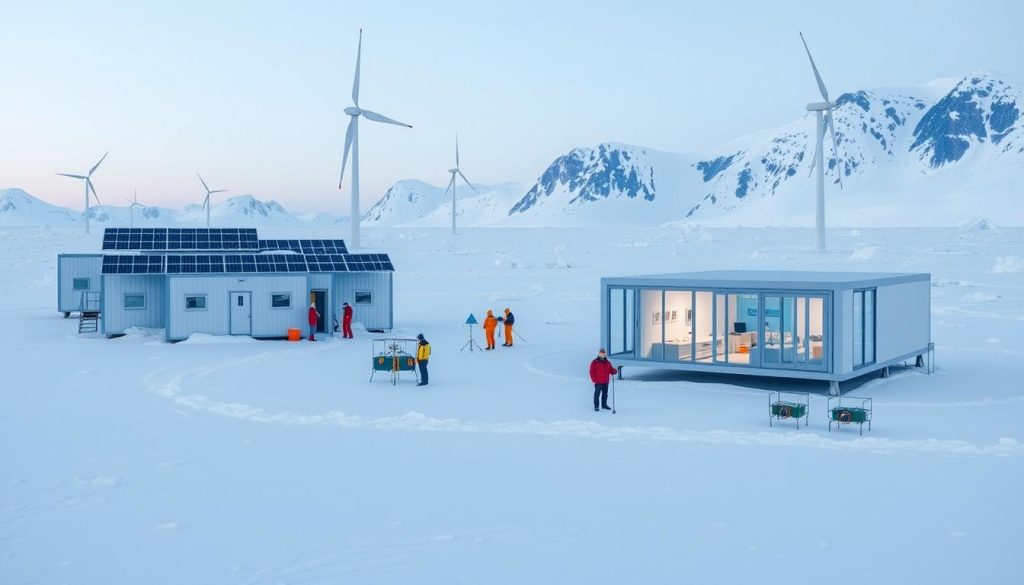
Creating field stations in Antarctica is vital for research and discovery. These stations must be strong and sustainable to survive the harsh climate. They help in conducting scientific studies over long periods. It’s important to use specific materials and building methods. This ensures the stations are safe and effective.
Building Durable Infrastructure
Strong infrastructure is key for detailed research. A good plan includes:
- Using materials that resist harsh weather, reducing damage.
- Designs that can change with the seasons are important.
- Advanced ways to keep the inside temperature comfortable.
Ongoing Support and Service Solutions
Regular maintenance keeps facilities working well. Companies provide important services like:
- Doing frequent checks and fixing problems to avoid breakdowns.
- Help with logistics to make sure resources are available.
- Training staff on how to deal with emergencies.
Educational Opportunities in Antarctica
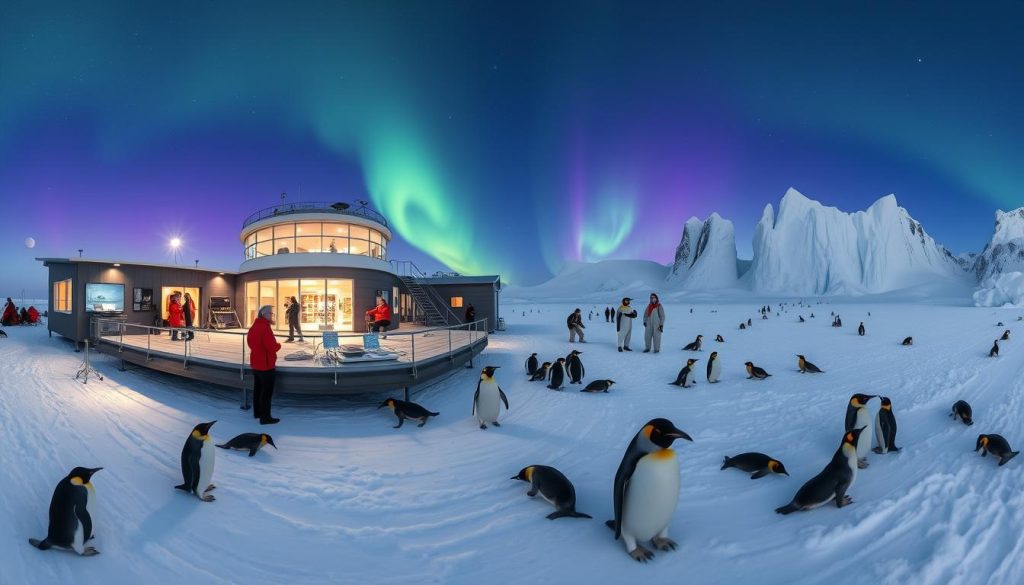
Antarctica offers unique chances for learning. It has specialised programmes that help in exploration and research. Businesses are key in creating workshops. These are for adventurers. They teach important skills and knowledge about Antarctica’s ecosystem.
Workshops and Training for Explorers
Workshops for explorers cover different topics, such as:
- Survival skills in extreme conditions
- Understanding the Antarctic ecosystem
- Field research methodologies
These workshops do more than just teach skills. They help people respect the Antarctic environment more.
Partnerships with Academic Institutions
Academic partnerships make research in Antarctica stronger. Working with universities and research groups offers:
- Access to top-notch facilities and resources
- Chances for students and volunteers to learn by doing
- New research projects that help the local scene
These partnerships build a community. It’s full of learners ready to face Antarctica’s unique environment and its challenges.
Adventure Sports and Activities
Antarctica offers a unique place for thrill seekers and the adventurous at heart. Its extreme conditions and beautiful landscapes provide many chances for adrenaline-packed activities. With more people looking for uncommon experiences, specialised tours for extreme sports enthusiasts are becoming popular there.
Extreme Sports Tours for Thrill Seekers
In Antarctica, extreme sports tours offer exciting activities like ice climbing, snowboarding, and polar trekking. These adventures challenge traditional exploration and let adventure seekers deeply connect with Antarctica’s fragile environment. Tour companies focus on responsible tourism. They ensure the breathtaking wilderness is protected while letting tourists experience nature in new and exciting ways.
Winter Sports Facilities and Events
Introducing winter sports facilities and organizing events makes Antarctica even more attractive for winter sports fans. Developing infrastructure, such as ski slopes and ice rinks, can draw tourists and boost the local economy with sports events and competitions. This plan supports adventure sports and also protects the beautiful Antarctic environment for the future.

